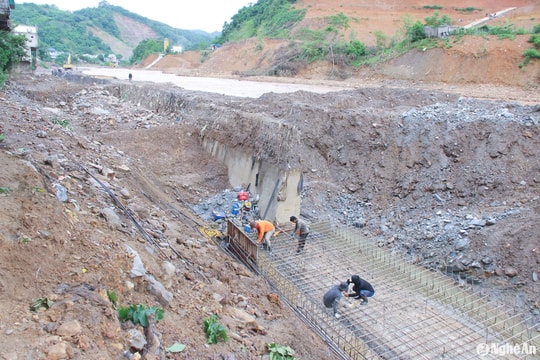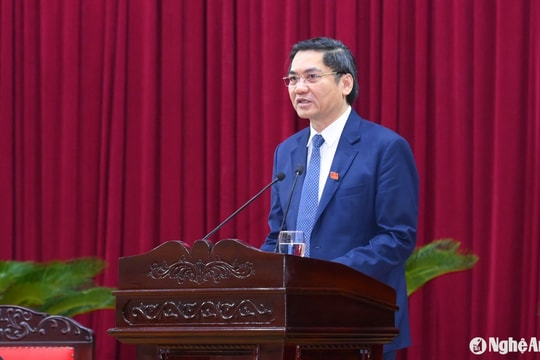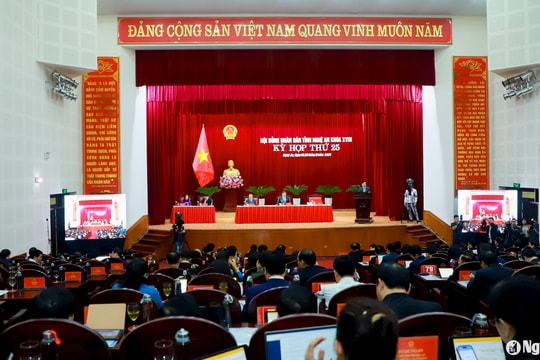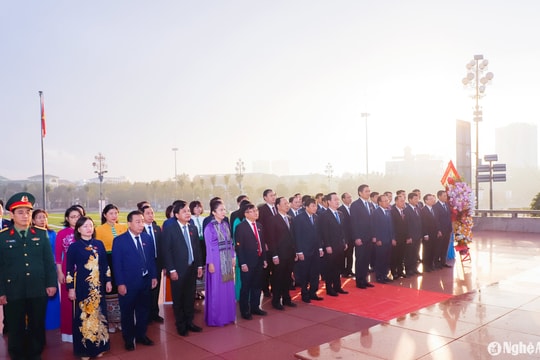Resource allocation is not consistent with policy
The opinion of the People's Council delegate of Nghe An province is that the ability to balance the budget to implement mechanisms and policies is still inadequate.
On the morning of December 5, the Provincial People's Council delegates from 5 constituencies including Thanh Chuong, Nghia Dan, Tan Ky, Yen Thanh, and Thai Hoa discussed in Group 3.

The discussion session took place right after the opening session and listened to reports presented to the Provincial People's Council at the 25th Session, 18th Provincial People's Council, term 2021 - 2026.
Attending the discussion session were comrades: Nguyen Nam Dinh - Member of the Provincial Party Standing Committee, Permanent Vice Chairman of the Provincial People's Council; Bui Thanh An - Member of the Provincial Party Standing Committee, Vice Chairman of the Provincial People's Committee; Nguyen Van De - Member of the Provincial Party Executive Committee, Vice Chairman of the Provincial People's Committee.
Ms. Le Thi Theu - Provincial People's Council delegate, Vice Chairman of Tan Ky District People's Council, chaired the discussion.
Slow implementation policy
At the discussion session, 11 delegates (including 2 invited delegates) expressed their opinions on many fields. Many of them highlighted the implementation of central and provincial policies in the area. Besides the achieved results, the allocation of resources to implement some policies is still slow.

Delegate Lo Thi Kim Ngan - Head of the Ethnic Committee of the Provincial People's Council, Thanh Chuong Delegation cited the slow implementation of some policies in the cultural field issued by the Provincial People's Council, such as: Support for cultural equipment for villages after mergers, equipment for children's entertainment activities is slow to be allocated funding.
"There are support contents for 2023, but the villages will only receive them in 2024; there are support contents for 2024, but only now have the procedures for approving the budget estimate and contractor selection plan been carried out," the delegate cited.
Similarly, the implementation of the resolution of the Provincial People's Council issued in 2023 on supporting investment in swimming pools and organizing swimming lessons for children in the province also had a number of registrations that did not meet the target set out in the resolution.
From this reality, the delegate said that the agency in charge of advising on the development of an investment support mechanism during the policy impact assessment process has not anticipated difficulties, obstacles and effectiveness in practice, leading to the resolution just issued having to request advice on amendments and adjustments to suit the current practical situation.
Therefore, delegate Lo Thi Kim Ngan proposed that the Provincial People's Committee direct the branches and agencies to advise and preside over the implementation of these resolutions, adding tasks, solutions in a focused, key manner and specific measures to overcome; at the same time, enhance the responsibility of the heads of branches, localities and units in leadership, direction, and ensuring the implementation of policies after promulgation.

Delegate Pham Tuan Vinh - Member of the Provincial Party Executive Committee, Secretary of the Provincial Party Committee of the Provincial Agencies Block, and the delegation of Thai Hoa town highly appreciated the socio-economic results and strategic tasks that the province has achieved in 2024 to create momentum for development in the coming time.
However, through studying the socio-economic report, delegates were concerned when the province's OCOP products had a large number with 739 products meeting 3-star standards or higher, ranking 2nd nationwide, but only 37 products reached 4 stars (approximately 5%); while the national average was 25.8% and only 1 product reached 5-star standards (approximately 0.4%), while the national average was 2.1%. Pointing out the current situation, delegate Pham Tuan Vinh hoped that the Provincial People's Committee would direct the sectors to have more effective solutions to improve the quality of OCOP products.
The delegate of Thai Hoa Town also expressed concerns about the “health” of businesses in the province when about 16,000/39,000 registered businesses are operating; while 25,000 businesses (about 165,000 businesses nationwide) have stopped operating. From there, the delegate requested to clarify the difficulties of businesses in order to find solutions.
Delegate Pham Tuan Vinh said that this year's budget revenue is expected to be 23,751 billion VND, however, as the Provincial People's Committee recognized, budget revenue is still unsustainable when nearly 40% of revenue comes from land fees.
"High land prices prove that there is a lot of land for sale," the delegate analyzed and pointed out the unreasonable point that despite high supply, the real estate market is still "heating up" every day, especially in Vinh city.
“Apartment prices are skyrocketing, some areas are over 30 million/m2.2", said delegate Pham Tuan Vinh, adding that this greatly affects the attraction of workers, especially high-quality workers. Therefore, the delegate suggested that the Provincial People's Committee pay attention to allocating more land funds, including land funds for building social housing to increase the supply for the real estate market, helping workers, including young workers, to have access to housing.
Delegate Pham Tuan Vinh also requested the Provincial People's Council to study and have a plan to implement resolutions on a number of specific policy mechanisms for Cua Lo and Vinh city when Cua Lo has merged into Vinh since December 1, 2024. "So will the resolutions of the Provincial People's Council on Cua Lo town be adjusted or not and if so, how will they continue to be implemented?", the delegate raised the issue.

Also at the discussion session of Group 3, delegates also raised many opinions related to the slow disbursement of career capital for a number of national target programs; considering improving policies for village and hamlet officials; reviewing the goals associated with building a suitable roadmap for digital transformation at the grassroots level so that the digital transformation process is substantial, becomes a need and is implemented by the people themselves, and there is no longer a situation where officials do it for them like in some localities today.
In addition, delegates also expressed opinions such as: The progress of site clearance for some projects is still slow; there are solutions to disseminate, replicate, and spread folk songs more effectively; handling surplus real estate after restructuring the apparatus to avoid waste...
Appropriate balance between promulgated policies and implementation resources
Attending the discussion at Group 3, leaders of the Provincial People's Committee and the Standing Committee of the Provincial People's Council discussed a number of related issues. Vice Chairman of the Provincial People's Committee Nguyen Van De analyzed the objective and subjective reasons leading to the slow disbursement of public capital for national target programs; thereby, he said that the Provincial People's Committee has been directing departments and branches to focus on solving problems and increasing the disbursement rate.

In particular, regarding opinions on the quality of OCOP products, Vice Chairman of the Provincial People's Committee Nguyen Van De admitted that the quality is not high and the output is still difficult, although the province has directed continuous promotion with many solutions.
Recognizing that Nghe An's OCOP products have been developing in breadth first and depth later, the Vice Chairman of the Provincial People's Committee said: In the coming time, the province will focus on improving quality to have many 4-star and 5-star OCOP products.
Vice Chairman of the Provincial People's Committee Bui Thanh An also analyzed the revenue structure and explained why revenue from land fees still accounts for a large proportion of the province's budget revenue. Presenting a series of solutions to increase the province's domestic revenue without counting revenue from land, he said that the most important thing is to attract investment to expand the revenue base.

The province's success in recent years is considered to be great; however, the projects that are being built or have just come into operation are still enjoying tax incentives under the investment incentive policy, so the Vice Chairman of the Provincial People's Committee said: The budget revenue from these projects is always slower than the economic growth rate, meaning there is a gap.
“If we attract investment in this term, we will be able to attract investment in the following terms,” he said. “The Provincial Party Committee Standing Committee, People’s Council and People’s Committee are very persistent in improving the efficiency of attracting investment and creating jobs to increase budget revenue.”
Regarding the budget allocation to implement mechanisms and policies as reflected by delegates, Vice Chairman of the Provincial People's Committee Bui Thanh An agreed with the assessment that many mechanisms and policies are allocated very slowly. Starting from 2025, the Provincial People's Committee will direct strongly to allocate to beneficiaries right from the beginning of the year.
In general, entering the 2025 - 2030 term, based on the new term's orientation with 3 strategic breakthroughs, the Vice Chairman of the Provincial People's Committee said that the viewpoint is that it is necessary to review all mechanisms and policies; when promulgating, there must be resources to ensure effectiveness.

Regarding the above content, the Standing Vice Chairman of the Provincial People's Council, Nguyen Nam Dinh, also commented that the ability to balance the budget to implement mechanisms and policies is still inadequate. Currently, the need to introduce mechanisms and policies is 3 times greater than the balancing capacity of the financial sector. Therefore, in the coming time, the Provincial People's Council will coordinate with the Provincial People's Committee to review policies, with the goal that the issued policies must be consistent with the balancing capacity of the provincial budget.





